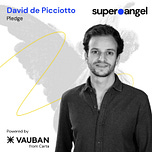Today, we're happy to welcome you to David de Picciotto, Co-founder & CEO of Pledge, a climate software company helping decarbonise the logistics supply chain through its accredited and integrated platform. Founded in 2021 in the UK, Pledge is backed by venture investors including Zinal Growth, Lowercarbon Capital and Visionaries Club. Before Pledge, David worked for Partners Group, a global private equity firm, where he focused on growth equity investments and previously led International Expansion at Revolut, the UK FinTech. David is also the co-founder of media start-up iRewind, where he exited in 2016. David is also one of the trailblazing Sequoia scouts leading the charge in Europe 🚀 You’re in for a treat 🍦
When I look at some of the angel investments I've made, the ones where I did more of a gut-feel-bet rather than trying to be very thorough in my analysis are, so far, the ones that have yielded the highest paper returns.
TOC // Read the core learnings below the video 👀
Diverse Backgrounds Can Lead to Unique Investment Opportunities
Serendipity and Keeping a Wakeful Eye are integral
Angel Investing Offers Valuable Insights for Entrepreneurs & Operators
Fund Investing as a Strategy for Access to Deals
No Need for a Fixed Strategy at the Start
Find your balance between Art and Science
Stick to What You Know
Solve for unbounded upside, not limited Downside Risk
Know Your Value Proposition
Don’t think you need to put big tickets
This episode was made possible by our friends over at Vauban from Carta - the easiest way to launch & run your fund and syndicates. It’s no secret that we at eu.vc are happy and heavy users of the Vauban platform as it allows us to punch out more content for you guys without bogging us down in back-office hassle.

For a very special treatment, use this form to let the Vauban team know you’re coming from the eu.vc community 🤗
Learnings from David’s Journey Into Angel Investing
Diverse Backgrounds Can Lead to Unique Investment Opportunities David's background at Revolut and formerly in private equity gave him a unique perspective and network, leading to organic investment opportunities.
Serendipity and Keeping a Wakeful Eye are integral Asked about his most memorable deals David mentions three that underscore the importance of serendipity:
And then we got to the final interview round. But then he decided that he wanted to found his own company, and when he rejected our offer I reached out to him to hear more and hear if I could participate”
Angel Investing Offers Valuable Insights for Entrepreneurs & Operators While some believe founders and execs shouldn’t be investing on the side of their business, we’ve found through all our Super Angel episodes that angel investing and being an operator complement each other, both in terms of skillset, finding new inspiration, and building powerful networks.
So by being present in a lot of these countries with feet on the ground as part of day-to-day, I got to meet a lot of entrepreneurs and a lot of early stage companies and a lot of regulators and this has opened quite a few doors for me.
Fund Investing as a Strategy for Access to Deals David's strategy involves fund investing to gain exposure to ecosystems he doesn’t have good access to directly, in his case, primarily micro funds operating in emerging markets and people who he has met through his angel investing.
David’s Investment Thesis & Strategy
No Need for a Fixed Strategy at the Start Having a rigid strategy isn't necessarily a must when starting out on your angel journey. In fact, the first checks are often about getting a foot in the door and then strategies evolve over time as you build up experience.
I'm probably gonna disappoint you here, because I wouldn't go to the extent to say that I have a strategy, or at least that I had a strategy when I started. Initially it was all about getting in.
Find your balance between Art and Science Recognize that early-stage investing is more art than science, particularly when providing the first check to a startup. Avoid overanalyzing and be open to the dynamic nature of early-stage investments.More in art than science at this stage when you're the first check.
Stick to What You Know While this allows you to better diligence deals, it also increases the odds that you’ll be able to access the very best deals and deliver strong value to the founding team. For David in particular, he’s found a sweetspot in identifying successful models from familiar markets and their adaptation to other regions.
I try to stick to what I know or put differently what I have some experience in and try to back models that I've seen successful in other markets.
David’s Core Learnings from Angel Investing
Solve for unbounded upside, not limited Downside Risk The primary mindset shift that’s difficult for many, because there’s almost no other place where you apply this type of thinking to such an exteme, is to focus less on downside risk and more on the potential for significant growth.
I try not to think too much about downside risk, but rather as, as I mentioned earlier, try to think about how big can this get, if the stars align.
You must acknowledge that many angel investments will fail and for that reason make sure to aim for substantial success when they don't. This underscores the importance of building a diversified portfolio and often investing smaller amounts than you might actually feel tempted to.
Know Your Value Proposition You want to consider your "right to play" and what unique value you bring to founders - Gaining access to the best startups isn’t easy, so you need to bring something special. For David, experience in scaling a company in a complex, regulated space such as financial services is a superpower that secures him a place at the most coveted tables.
The reason I got in is because they were keen to speak with someone who was.
Don’t think you need to put big tickets David only recently realized how inconsequential your ticket size is to founders and thus your access:
As an angel, whether you put $500, one K, five K, 10 K, or 50 K as part of a multimillion seed round or series A round most of the time it won't change anything to the founder.
🔫 The Quickfire Round 🔫
What's the most counterintuitive thing you've learned since you started Angel investing?
A: Keep it very simple. Often, when you think about investments, you try to be very analytical, thinking about market sizing, thinking about market tailwinds, unit economics, and all these things. But in the context of angel investments, I think it’s more about just sticking to the basics:
Team
Timing
Unbounded upside
When I look at some of the angel investments I've made, the ones where I did more of a gut-feel-bet rather than trying to be very thorough in my analysis are, so far, the ones that have yielded the highest paper returns.
What would be your top tips to Angels investing internationally?
A: Connect with local funds and build a relationship with them by demonstrating the domain expertise you have or the connections that you can make.
What advice would you give to your own 10 year younger self if you only had 30 seconds?
A: Don't listen to your 10 years older self! And the reason I'm saying this is that 10 years ago I was probably at an age where you should just go and do stuff and not listen to advice but rather follow your instincts and build your own experiences. But to be fair, if you ask me the same question in 10 years, I'll probably give you a different answer.
And don’t forget to use this form to receive a very special treatment when heading over to Vauban.io to get the hassle-free back-office for your fund and SPVs that you’ve always dreamt of 🫠











